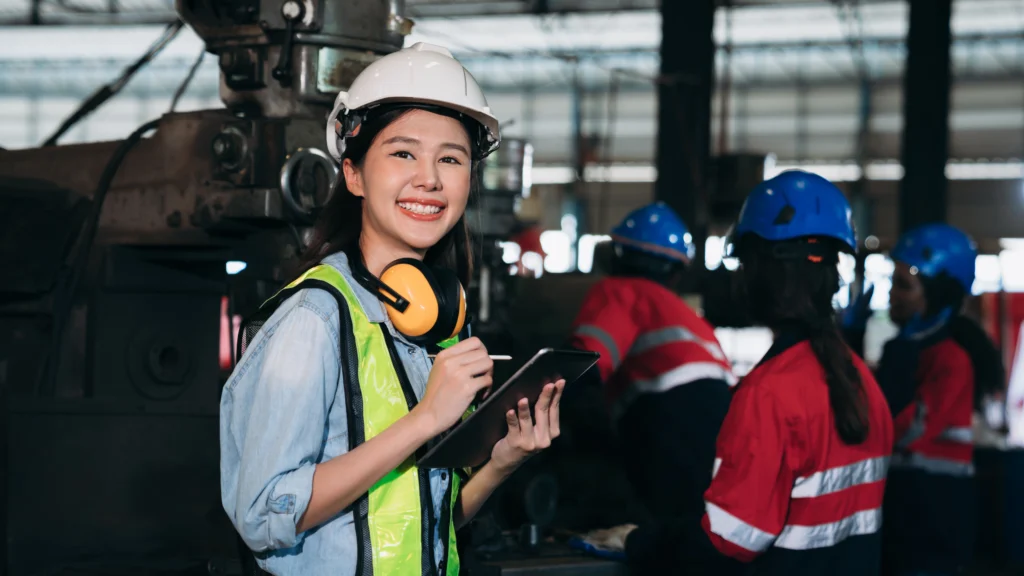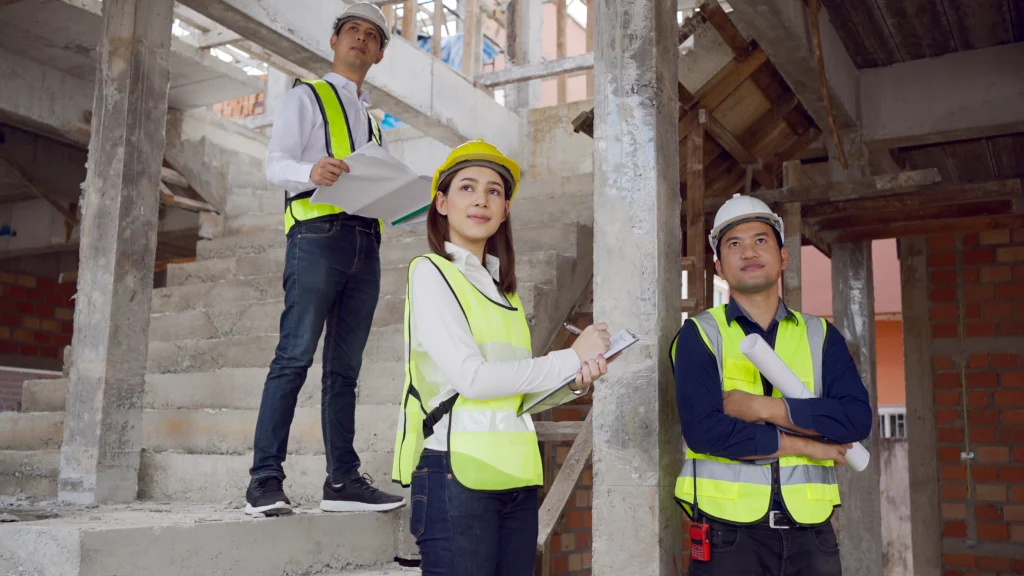The construction industry, one of the most essential and dynamic sectors worldwide, has always been synonymous with physical labor and traditional project management practices. However, as the industry continues to evolve, a digital revolution is underway, with technology making a profound impact on every aspect of construction, from project planning and scheduling to on-site operations and office management. Among these innovations, Virtual Construction Assistants (VCAs) have emerged as game-changers, offering significant advantages for construction office assistants and companies alike.
In this blog, we will explore the role of Virtual Construction Assistants, their benefits, and how they are transforming the way construction office assistants perform their daily tasks. We’ll also discuss best practices for integrating VCAs into your business, how they help streamline office operations, and why they represent the future of construction management.

What is a Virtual Construction Assistant?
A Virtual Construction Assistant (VCA) is an AI-powered or software-driven assistant designed to handle administrative and managerial tasks within the construction industry. Similar to traditional administrative assistants, VCAs are responsible for managing schedules, handling communication, coordinating tasks, and assisting with project documentation. The key difference, however, is that VCAs are virtual and rely on cutting-edge technologies such as Artificial Intelligence (AI), Machine Learning (ML), and cloud-based platforms to automate and streamline administrative tasks, significantly increasing efficiency and reducing human error.
For construction companies, this technological innovation offers numerous advantages, particularly for construction office assistants who have traditionally spent a significant portion of their day dealing with repetitive administrative tasks. By utilizing a VCA, construction office assistants can focus on higher-level tasks that require human judgment, such as team coordination and project strategy.
The Growing Need for Construction Office Assistants
In any construction project, office assistants play a pivotal role in ensuring that administrative duties are handled promptly and efficiently. Whether it’s managing project documents, coordinating meetings, processing payroll, or keeping track of daily activities, the role of a construction office assistant is vital to the smooth operation of a project.
However, the fast-paced nature of the construction industry often places a heavy burden on office assistants. With a multitude of tasks to handle at once, construction office assistants are regularly required to work long hours, which can lead to burnout, inefficiency, and even human error. The demand for construction office assistants continues to grow as projects become more complex, deadlines become tighter, and the expectation for better communication and project management increases.
Virtual Construction Assistants offer a solution to this problem. By automating routine tasks and allowing for better management of time, VCAs give construction office assistants the tools they need to perform more effectively, allowing them to focus on more strategic areas that require human input.

How Virtual Construction Assistants Benefit Construction Office Assistants
- Automation of Routine Administrative Tasks
One of the most immediate benefits of adopting a VCA is the automation of routine administrative tasks that often take up a considerable portion of a construction office assistant’s day. These tasks include:
- Scheduling and calendar management: Virtual assistants can schedule meetings, manage appointments, and send reminders for upcoming deadlines or events.
- Document management: VCAs can handle file organization, document storage, and even assist with creating and maintaining reports.
- Communication management: Whether it’s responding to emails, managing phone calls, or sending reminders and updates, VCAs help streamline communication within the office.
- Data entry: Entering project information, employee details, and financial data can be time-consuming. Virtual assistants help eliminate this task by automatically inputting data into the required systems.
By automating these mundane tasks, construction office assistants can focus on tasks that require more decision-making, human input, and relationship-building. This ultimately leads to improved productivity, less stress, and more satisfied employees.
- Increased Efficiency and Productivity
The construction industry is often characterized by tight timelines, budget constraints, and numerous stakeholders involved in a single project. Efficiency is key to ensuring that projects are completed on time and within budget. By implementing a Virtual Construction Assistant, construction office assistants can streamline office operations, leading to increased productivity.
Virtual Construction Assistants can also coordinate tasks between different departments and workers, ensuring that everyone is on the same page. For example, the VCA can automatically notify the team about upcoming deadlines, procurement orders, or changes in project plans, helping avoid any miscommunication or missed deadlines. This increased efficiency helps keep projects moving forward smoothly and prevents delays that can be costly.
- Improved Communication Across Teams
Effective communication is one of the most important aspects of any construction project. Construction office assistants are often the main point of contact for many team members, subcontractors, and clients. The VCA’s ability to assist with communication ensures that all parties are kept up to date on progress, changes, and any issues that arise. This results in:
- Centralized communication: Virtual assistants can collect and store all project-related communication, making it easier to track conversations, requests, and decisions.
- Instant updates: VCAs can send automatic notifications and updates to key stakeholders, ensuring no one misses important information.
- Seamless communication with vendors and contractors: Virtual assistants can automatically send reminders and updates to vendors and contractors, keeping everyone on track.
By ensuring that communication is always clear and up-to-date, construction office assistants and teams can avoid misunderstandings, errors, and miscommunication that can lead to costly mistakes.
- Cost Savings
Adopting a Virtual Construction Assistant can result in significant cost savings for construction firms. By automating tasks that would normally require manual input, construction office assistants can save time and reduce the need for additional staff. Virtual assistants also help prevent mistakes that might otherwise lead to expensive project delays or errors.
- Better Project Tracking and Management
Tracking the progress of construction projects can be overwhelming, particularly when multiple tasks, deadlines, and teams are involved. Virtual Construction Assistants can help with this by providing real-time updates and dashboards that allow construction office assistants to monitor progress, track budgets, and oversee timelines. This improves overall project management and ensures that tasks are completed on schedule.
Virtual assistants can integrate with other project management software tools, like Procore or Buildertrend, to provide a centralized platform for tracking various aspects of a construction project. This integration eliminates the need for multiple software systems and ensures that all stakeholders have access to the same information, promoting better coordination.
- Enhanced Customer Service
In the construction industry, customer satisfaction is paramount. A well-organized office assistant can help maintain good relations with clients by keeping them updated on project progress, answering their questions in a timely manner, and managing customer feedback. A VCA can automate much of this process, handling client inquiries, sending automated updates, and even helping with document generation, such as project contracts or status reports.
By enhancing the level of customer service, Virtual Construction Assistants contribute to positive client relationships, repeat business, and a stronger reputation within the industry.

Integrating Virtual Construction Assistants into Your Business
While the benefits of Virtual Construction Assistants are clear, it’s important to understand how to integrate them into your existing operations for maximum impact. Here are some best practices for successful integration:
- Choose the Right Software or VCA Tool Not all Virtual Construction Assistants are created equal. Take the time to research various tools and platforms to find one that suits your company’s needs. Look for software that offers customizable features, integrates well with your existing tools, and provides strong customer support.
- Train Your Team Even though VCAs are intuitive, your construction office assistants should undergo training to ensure they understand how to use the technology effectively. Proper training will ensure that the VCA is fully utilized, and your team can start reaping the benefits immediately.
- Start Small Begin by implementing the VCA for a few tasks, such as scheduling or document management, and gradually expand its role as you become more comfortable with the technology. This will help avoid overwhelming your team and ensure a smooth transition.
- Monitor and Optimize Regularly review the performance of the Virtual Construction Assistant. Ensure that it’s delivering the results you expect and make any necessary adjustments to optimize its effectiveness.

Construction Office Assistant is critical to the success of any project
The role of a construction office assistant is critical to the success of any project, but traditional methods of managing administrative tasks can be time-consuming and prone to errors. By adopting a Virtual Construction Assistant, construction companies can automate many of these tasks, allowing office assistants to focus on more meaningful work. With benefits such as increased efficiency, cost savings, and improved communication, VCAs are quickly becoming an indispensable tool in the construction industry. By integrating Virtual Construction Assistants into your operations, you can enhance your project management processes, improve customer service, and position your company for future success.
As the construction industry continues to embrace technological advancements, Virtual Construction Assistants will undoubtedly play a key role in shaping the future of construction project management.
